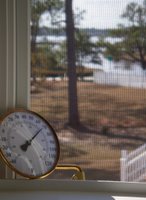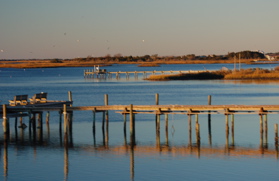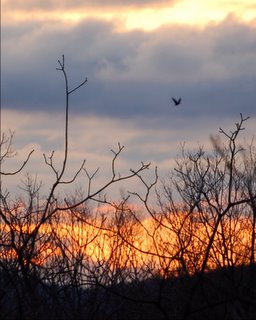 This morning I read "America the Overfull," in the New York Times (subscription required). The author, Paul Theroux, talks of a yearnng for a less crowded world.
This morning I read "America the Overfull," in the New York Times (subscription required). The author, Paul Theroux, talks of a yearnng for a less crowded world.Yes, it is just silly and fogeyish to yearn for that simpler and smaller world of the past. But one could ask for the past’s better manners, the instinctive decorum that has served to mitigate conflict. One of the lessons of travel is that, though half the world is wearing T-shirts and sneakers, they manage to live in overpopulated cities because they have not abandoned their traditional modes of politeness. These grace notes, which make traveling in crowded countries bearable, are a lesson to us in a mobbed and jostling world.I wonder what Mr. Theroux would think of North Carolina's Southern Outer Banks. I would guess that most people who read the NY Times have Nags Head, Corolla, and Duck in their mind's eye. I doubt most of them have ever even ventured down to Pea Island much less visited Cape Lookout by boat like I described in my post, "The best twenty dollars you will ever spend."
While I will agree that we have lots more people, there is still a tremendous amount of solitude if you are willing to get off the interstate highways. I've lived between US 29 and Interstate 95 when I worked in Columbia, Maryland so I know about the hum of the cities and the night sky that has no stars.
Then we moved to a mountain overlooking Roanoke, Va. While we could hear the city, all it took was fifteen minutes of hiking the mountain behind our house to lose even that noise and disappear in a forest of giant poplars which gave way to spruce trees as neared the top of Twelve O'Clock Knob. We often shared the trail with turkey, deer, and an occasional bobcat.
Roanoke, which is pretty laid back in its own rights, is a bustling metropolis compared to our spot on the White Oak River near Cape Carteret, North Carolina. Our cul de sac down by the water is absolutely silent at night. You can often go sit on the boardwalk and be alone with yourself, the wind, and the water unless one of the herons happens to fly by or a fish jumps out of the water.
While I know that our population has increased greatly, most of those people have crammed themselves into cities. Even on the east coast we have seen the recovery of many of our forest lands where trees have reclaimed much of the farm land that is no longer profitable to cultivate.
I know well the feeling that the crowds are winning. I have had that very feeling driving down Route 7 in Tyson's Corner, Virginia. Yet when I am heading to the North Carolina coast, the traffic begins to thin on Interstate forty twenty or thirty miles east of Raleigh. By the time I get to exit 373 where we pick up Route 24, there are very few cars on I40. If it is late at night, when we get on 24 there is almost no traffic. It reminds me of the many nights of traveling Route 11 in Virginia as teenager on my way to or from military school in Chattanooga, Tennessee. Even then when I went away to college in Boston, the crowds in the city shocked me.
Still we've got plenty of places to find solitude in North America. I've stood on hill at the back of the farm we used to have in Tay Creek, New Brunswick, Canada and wondered which way was civilization. There was none visible and certainly no noise from any.
When I walk the beaches of the Southern Outer Banks or get up to enjoy the sunrises, I know that there is plenty of solitude left in the world, you just have to know where to find it.














